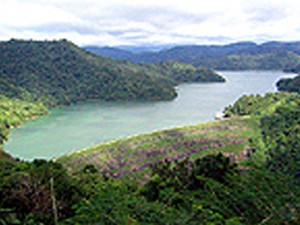Angat water level falls 2 meters below critical
MANILA, Philippines—With the water level at the Angat Dam now 2 meters below critical level, government authorities on Friday dispatched cloud-seeding planes to induce rain over Metro Manila’s major water source.
The Philippine Atmospheric, Geophysical and Astronomical Services Administration (Pagasa) said it would need up to three hours of continuous rain or almost 400 million drums of water to bring the dam’s water level above the critical mark of 180 m.
The Bureau of Soil and Water Management sent a cloud-seeding plane at 1:44 p.m. to seed the clouds with ice crystal-inducing compounds after its employees spotted large cumulus clouds forming over Bulacan and Pampanga, the dam’s watershed area.
Some rain was expected but authorities could not say how much would fall.
As of Friday morning, the water level in the Bulacan dam, the main source of water for Metro Manila and Central Luzon, was at 178.88 m, Pagasa hydrologist Richard Orendain said.
Less water for Metro
It fell by 13 centimeters from the day before, a less rapid rate than in the past days, as the dam management had reduced the water allocation to Metro Manila from 42 cubic meters per second (cms) to 36 cms.
Orendain, however, was quick to add that “the supply [to Metro Manila] is still the same, because there is still water in Ipo Dam,” a smaller subsidiary dam.
Some of the water in Angat Dam flows to Ipo Dam and then to La Mesa Dam in Quezon City, which provides 97 percent of Metro Manila’s water requirements, while the rest flows to Bustos Dam in Bulacan, which irrigates farmlands in Bulacan and Pampanga.
Orendain said it was the Metropolitan Waterworks and Sewerage System that determined how much water should be allocated to Metro Manila based on the water level in Ipo and La Mesa.
Still no rain
Orendain said the water level in Angat would continue dropping in the coming weeks, as “there was still no rain” in the watersheds of Bulacan and Pampanga flowing into the dam.
“In terms of drums, it will take 378 million drums of water for the water level in Angat Dam to return to normal,” he said. That would require 15 millimeters of rainfall on the entire watershed area or “about three straight hours of rain,” Orendain said.
But the hydrologist said rains in June or July in spite of the predicted onset of El Niño should help raise the elevation of Angat Dam.
“Probably by July, we’ll be seeing a rise in the water level, because when the rains come, it (the water) will saturate the soil first, and only when it is saturated will the water flow into the tributaries that lead to Angat,” Orendain said.
He said in an earlier interview that El Niño would peak in October and November; thus, rains, even though below average, were still expected in June to July.
Pagasa expects El Niño, a phenomenon marked by the warming of eastern and central Pacific waters, to affect the country in June, resulting in lower than average rainfall and stronger tropical cyclones. With a report from DJ Yap
RELATED STORIES
It will take a month to refill Angat dam
